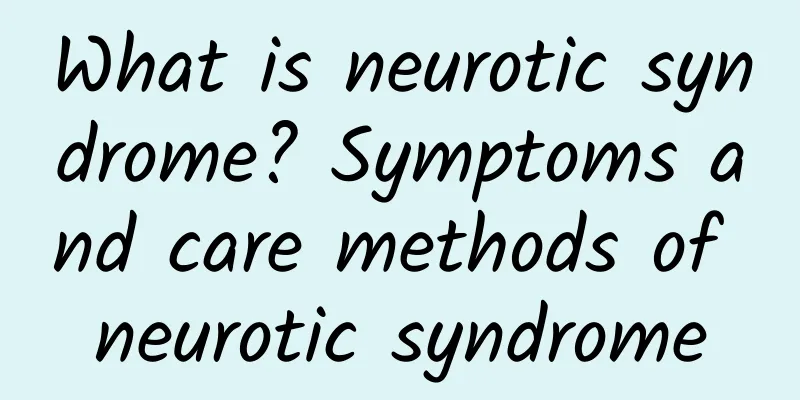What is neurotic syndrome? Symptoms and care methods of neurotic syndrome

|
Neurotic syndrome is not a disease, but a group of diseases. Neurasthenia, anxiety disorder, obsessive-compulsive disorder, etc. are all neurotic syndromes. Generally, patients will experience symptoms such as headache, chest tightness, palpitations, insomnia, and memory loss, which will have a great impact on their physical health and daily life. Next, I will introduce you to the relevant knowledge about neurotic syndrome. 1. Introduction to Neurotic Syndrome Neurotic syndrome, also known as neurosis, is a general term for a group of diseases, including neurasthenia, hysteria, obsessive-compulsive disorder, anxiety disorder, phobia, hypochondriasis and various visceral neuroses, such as cardiovascular neurosis, gastrointestinal neurosis, etc. 2. Symptoms and manifestations The symptoms of neurosis are complex and varied. Some include headaches, insomnia, and memory loss; others include palpitations, chest tightness, and feelings of fear. Its characteristic is that the emergence and changes of symptoms are related to mental factors. For example, some patients with gastrointestinal neurosis suffer from diarrhea whenever they are emotionally stressed. The main manifestation is persistent psychological conflict. The patient is aware of or experiences this conflict and is deeply distressed by it, which greatly hinders psychological or social functioning, but there is no verifiable organic pathological basis. The patient often uses exaggerated or subconscious methods to deal with conflicts, and the condition lasts long, while his realistic judgment remains normal. 3. Daily care Daily care and health care The first point: Live a regular life, arrange your life reasonably, and try to combine work and rest. The second point: avoid excessive stress and do not engage in work that requires too long a duration and high concentration. The third point: Regularly participate in sports activities within your ability, such as Tai Chi, to exercise and enhance your physical fitness. Fourth point: People with severe insomnia can choose diazepam, chlordiazepoxide, brain-boosting mixture, oryzanol, multivitamins, propranolol, etc. Self-regulation therapy 1. Follow the advice of the psychiatrist and take some medication appropriately. 2. Adjust yourself, think more about study and work, don’t think about unnecessary things, and free yourself from worries. 3. Participate in physical exercise and cultural and sports activities, such as dancing and singing, to make you feel happy and get rid of worries. 4. Establish a correct outlook on life. Even if you are sick, you should "accept the situation as it comes", let alone if you do not have any organic disease. 5. Don’t use your brain too much in daily life and maintain a regular life. |
>>: What diseases cause blisters on the glans?
Recommend
How to Treat Hives
Urticaria is the most common skin disease in dail...
Special Chinese herbal medicine for treating tinea pedis and tinea manuum
Tinea pedis and tinea manuum are relatively commo...
What to do if your ankle is sprained and there is effusion
If you have an ankle sprain and fluid accumulatio...
Itchy and peeling facial skin
The facial skin is very important to everyone. If...
What are the early symptoms of gallstones?
Gallstones are also a common disease in life. Whe...
The more you touch this part of a woman, the healthier she becomes.
Women are always a hot topic. How many people hav...
What should not be eaten for cough asthma
Cough asthma is a common disease among the elderl...
What is hematospermia? Why do men have blood in their sperm?
Blood in semen is medically called hematospermia, ...
The effect of soaking scallion in red wine
The roots of green onions are the most inconspicu...
Does chronic gastritis cause chest tightness? How does TCM treat it dialectically?
Gastritis is a disease that exists in most people...
What are the causes of spinal pain?
If you do too much physical work in your daily li...
Will my breasts swell during ovulation?
Breast pain during ovulation is a relatively norm...
Gum side teeth
Everyone has the chance of growing wisdom teeth, ...
Can tuberous sclerosis heal on its own?
Tuberous sclerosis complex is a chromosomal domin...
How to treat tinea versicolor
When we talk about skin diseases, the first thing...









